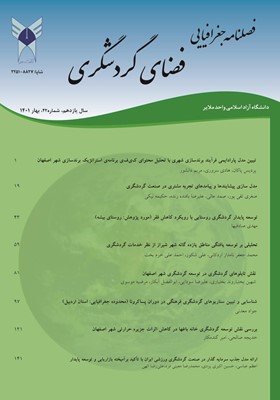شناسایی و تبیین سناریوهای گردشگری فرهنگی در دوران پساکرونا (محدوده جغرافیایی: استان اردبیل)
محورهای موضوعی : مربوط به گردشگری
1 - استادیار گروه مدیریت دولتی و گردشگری، دانشگاه محقق اردبیلی، اردبیل، ایران
کلید واژه: گردشگری فرهنگی, سناریونگاری, دوران پساکرونا, مدل سهشاخگی,
چکیده مقاله :
گردشگری فرهنگی یکی از انواع گردشگری است که از متأثر از آسیبهای جدی اپیدمی کرونا است. اکثر کشورها در دوران پساکرونا در تلاش برای به جریان انداختن گردشگری فرهنگی را دارند که آنها را ملزم به اتخاذ رویکردها و روشهای جدیدی کرده است. هدف اصلی تحقیق حاضر، شناسایی و تبیین سناریوهای گردشگری فرهنگی در دوران پساکرونا است که با محوریت استان اردبیل صورت میپذیرد. روش تحقیق ترکیبی است که با استفاده از رویکرد متوالی اکتشافی به ترتیب از دو روش "گروه کانونی و برنامهریزی سناریو" استفاده شده است. ابزار اصلی مورد استفاده در فاز کیفی، مصاحبه نیمه ساختاریافته در قالب گروه کانونی آنلاین بوده و در فاز کمّی، پرسشنامه است. مشارکتکنندگان پژوهش حاضر، 8 نفر از خبرگان و صاحبنظران دانشگاهی و اجرایی کشور در حوزه گردشگری فرهنگی بودند که در گروه کانونی شرکت نمودند. مطابق با یافتههای تحقیق، در فاز کیفی، 13 کد اصلی در قالب سه مفهوم اساسی استخراج شدند که این مفاهیم، با استفاده از مدل سهشاخگی دستهبندی شدند. مطابق با بحث و نتایج حاصله، 4 سناریو ایجاد شدند که هریک از آنها میتوانند به ایجاد انعطافپذیری لازم در حوزه گردشگری فرهنگی کمک کرده و باعث شوند تا این نوع گردشگری در استان اردبیل با همافزایی و نوآوری صورت پذیرد.
Cultural tourism is one of the types of tourism that is affected by the serious damage of the Corona epidemic. Most countries in the post-Corona era are trying to promote cultural tourism, which has required them to adopt new approaches and methods. The main purpose of this study is to identify and explain the scenarios of cultural tourism in the post-Corona era, which is focused on Ardabil province. The research method is a mix of two methods, ‘focus group’ and ‘scenario planning’, using a sequential exploratory approach. The main tool used in the qualitative phase is a semi-structured interview in the form of an online focus group and the quantitative phase is a questionnaire. The participants of the present study were 8 experts and academic and executive experts of the country in the field of cultural tourism who participated in the focus group. According to the research findings, in the qualitative phase, 13 main codes were extracted in the form of three basic concepts, which were categorized using the three-pronged model. According to the discussion and the results, 4 scenarios were created, each of which can help to create the necessary flexibility in the field of cultural tourism and make this type of tourism with synergy and innovation in Ardabil province.

